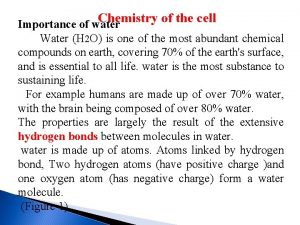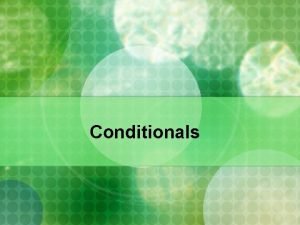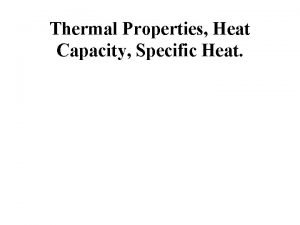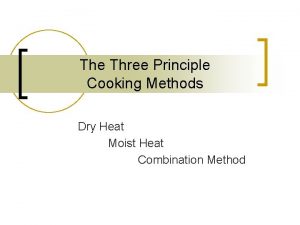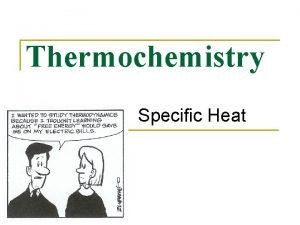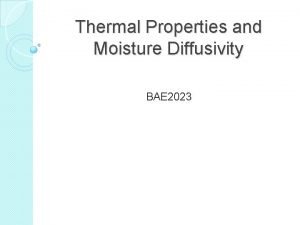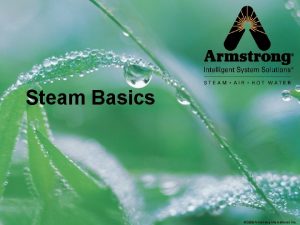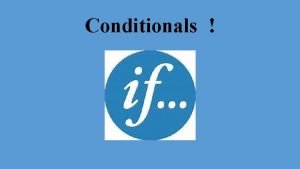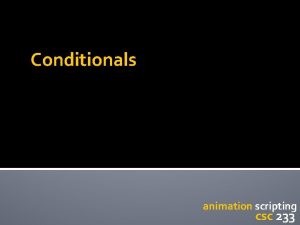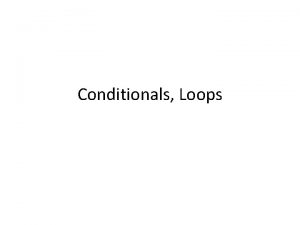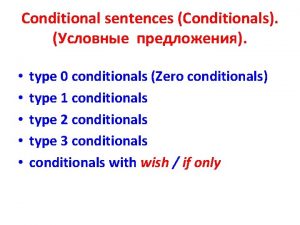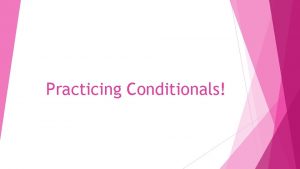Conditionals Conditionals n If you heat water to








- Slides: 8

Conditionals

Conditionals n If you heat water to 100˚C, it boils. conditional clause • • n main clause Conditional clause => the clause that starts with if, the condition Main clause => the clause that stands on its own, the result Water boils if you heat it to 100 ˚C. main clause • • conditional clause When the if-clause comes at the beginning, it is followed by a comma. The main clause may also come at the beginning of the sentence in which case it is not followed by a comma

Types of Conditionals n If you come with me to the party, you will have a nice time. Ø Ø n If you came with me to the party, you would have a nice time. Ø Ø n verb in the if clause: simple present Verb in the main clause: will + base form 1 st conditional Likely to happen/true now or in the future verb in the if clause: simple past Verb in the main clause: would + base form => 2 nd conditional Unlikely to happen now or in the future (unreal, hypothetical) If you had come with me to the party, you would have had a nice time. Ø Ø verb in the if clause: past perfect Verb in the main clause: would have + past participle => 3 rd conditional Unreal, hypothetical situations in the past

First Conditional: True/Likely in the Present or Future IF – CLAUSE V: simple present v. If he works hard v. If it rains tonight * , MAIN CLAUSE V: will + base form , he will pass the exam. , I will stay home. , If you heat water to 100˚C, it boils. Sometimes the verb in the main clause is in the simple present. This is true if it refers to a fact or something that is always true.

Second Conditional: Untrue (contrary to fact)/Unlikely in the Present or Future IF – CLAUSE V: simple past v. If I had more time, v. If she won the lottery, v. If he were* here v. If I were you * , , , MAIN CLAUSE V: would + base form I would write a grammar book. she would buy a house. he would know what to do. I would not listen to that man. In the seconditional, were is used for both singular and plural subjects in formal writing.

Third Conditional Untrue (contrary to fact) in the Past IF – CLAUSE , V: past perfect (had + past participle) v. If you had invited me, v. If you had studied more MAIN CLAUSE V: would have + past participle , I would have come. , you would have passed.

Omitting If in Conditional Sentences n n In conditional sentences, particularly types 2 and 3, “if” can be omitted from the conditional clauses. In this case the subject and the auxiliary are inverted. First Conditional If Robert should come early, we will start at 9 am. Should Robert come early, we will start at 9 am. If I were rich, I would go on a world tour. Were I rich, I would go on a world tour. If Nicole had trained more, she would have won. Had Nicole trained more, she would have won. (only with should) Second Conditional (only with were) Third Conditional (all the time)

The expressions only if & as long as n These two expressions are used when the cause is absolutely necessary in order for the effect to take place. • • n We’ll go to Zara only if the sale is still on. You can get a tattoo as long as it is a small one. If the conditional clause is begun with the expression only if, the subject and the auxiliary in the main clause are inverted. • Only if I see dramatic results will I stay on this horrible diet.
